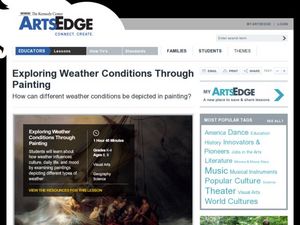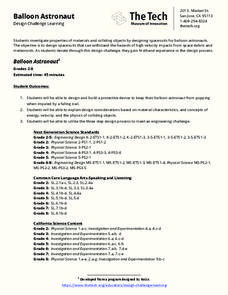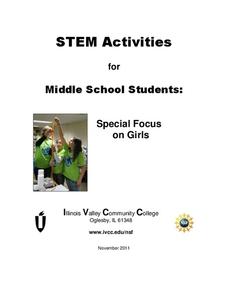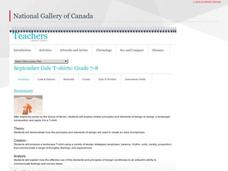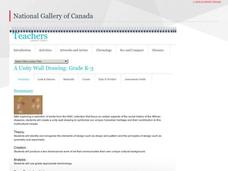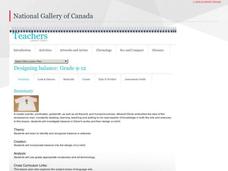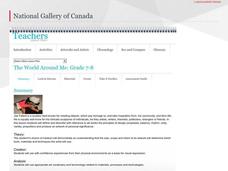Curated OER
Japanese Tea and Teacups
Upper graders use the potter's wheel to make Japanese style tea cups, which they will use in a Japanese style tea ceremony. They hone their sculpting techniques while exploring Japanese cultural and the history of tea. There are two...
Curated OER
Drawing Portraits Using a Grid
A well-developed art instructional activity is always great to have around. This instructional activity on portrait drawing includes a full procedure, modifications, background information on artist Chuck Close, recommended websites, and...
Curated OER
Exploring Weather Conditions Through Painting
Your advanced class will paint a picture of a particular weather condition. In this painting lesson students describe elements of art in pieces of artwork. They analyze the weather and seasons in the artwork. The students use paper,...
Sargent Art
Symmetry: A Design Problem
As part of a study of design, young artists examine an example of a formal (symmetrical) design and then, following step-by-step directions, create their own.
Brigham Young University
Understanding Design, Composition, and Color
The set for a play combines design elements (style, line, shape, mass, measure, position, color, and texture) and principles of composition (unity, harmony, contrast, variation, balance, proportion, and emphasis) to create a particular...
Brigham Young University
Computer Age
Theater arts class members get a chance to see how professionals employ tech tools. As they sketch, render, build models, and prepare presentations of the set design for a current show, learners either visit a professional theater or by...
Tech Museum of Innovation
Balloon Astronaut
Design protection from high-speed particles. The STEM lesson plan highlights why astronauts need protection from space debris. Pupils use the design process to design, build, and test a spacesuit that will protect a balloon from a...
Illinois Valley Community College
STEM Activities for Middle School Students
Use STEM activities within the class to provide connections to concepts. The resource includes activities that range from working with buoyancy to building rockets and launching them. Other activities involve the engineering design...
National Gallery of Canada
September Gale T-Shirts
Focus on the principles of design with a wearable landscape art project. The plan provides definitions to share and art to examine. After students have a grasp of the principles, they draw a scene to eventually transfer onto a...
National Gallery of Canada
Build a City of the Future!
Tap into your pupils' imagination by asking them to design futuristic, ideal cities. They must discuss and take scale and size into account, looking at some model pieces of art for inspiration and analysis. The final product for each...
National Gallery of Canada
The Body Tells Its Story
Incorporate sculpture into your art curriculum. To start, pupils discuss the artistic process and topics of marginalization. With the discussion in mind, individuals select images to inspire sculptures of people that they will present to...
National Gallery of Canada
A Unity Wall Drawing
Build class community with an art project. Learners first examine and discuss works of art. They then contribute to a class mural by tracing their hands and decorating them in relation to their own cultures. The final mural...
National Gallery of Canada
One Look Is Worth A Thousand Words
Facial expressions can communicate complex emotions. Examine expressions in several hyperrealistic works of art before beginning a project. Learners will create their own clay faces that show an emotion using either photos or their own...
National Gallery of Canada
Designing Balance
Teach your artists how to incorporate balance into their work through discussion and action. After viewing and discussing several works of art, learners design a balanced image for a T-shirt and follow the step-by-step instructions to...
National Gallery of Canada
Emphasizing Prints
Focus on how an artist creates emphasis on certain areas of a work with an examination of several works of art and a printmaking project. Follow the discussion suggestions and step-by-step printmaking instructions to successfully...
National Gallery of Canada
Reading Sculptures
Consider the elements and principles of design closely while examining works of art. Learners select an image from the provided pieces to write about in relation to the elements and principles of design. They then sketch and sculpt their...
National Gallery of Canada
My Own Blanket
Invite your young artists to design blankets that express their own identities. Learners examine various pieces of art before brainstorming a few things that represent their identities. They use these ideas, in addition to symmetry and...
National Gallery of Canada
Tantalizing Tessellations!
Examine repeating and intricate patterns with a study of M.C. Escher and a related art activity. Pupils view and discuss the artwork before creating their own tessellating patterns. Step-by-step instructions for creating a template are...
National Gallery of Canada
Picture This!
Introduce your class to Inuit prints and use these artworks as inspiration for a printmaking activity. Pupils make stories to go along with the images and then come up with their own heroic moments to illustrate. They take moments from...
National Gallery of Canada
My Upside-Down World!
M.C. Escher is famous for creating optical illusions. Examine this effect in several of his works and discuss the techniques involved. Inspired by the discussion, learners create an imaginary 3-D world inside of a box using various...
National Gallery of Canada
The Ideal Trophy
Invite your pupils to represent a club, team or other group with a trophy of their own creation. Learners examine the Taylor Cup by Laurent Amiot and then prepare trophy designs. When the sketches are complete, pupils sculpt...
National Gallery of Canada
Lumps, Bumps, Gritty, and Soft!
Texture can really add to a work of art. Explore texture through observation and practice. Learners view and discuss works of art by M.C. Escher. They then create their own texture samplers with six different materials.
National Gallery of Canada
The World Around Me
Have your learners use their surroundings as inspiration for an art project. Class members first examine and discuss art. They then choose an area and spend five days taking down observations in written and sketch form. These...
National Gallery of Canada
Panoramic Landscapes
Combine landscape with collage to create unique art pieces. Class members examine works of art before creating their own pieces with photos of a special place. Learners create a panoramic image and add in figures.




